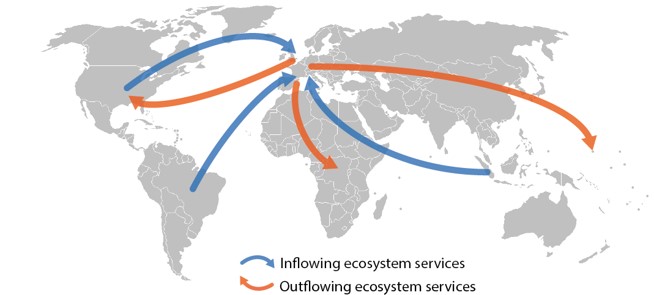1. Introduction & Objectives
Currently we see many studies, which focus on mapping, modelling and valuing a set of ecosystem services for a specific region or nation. For example the EU member states are asked to map ecosystem services in the framework of the Biodiversity Strategy 2020. Quite frequently those activities chose the political border as their system boundaries assuming that the regions are closed. However, those regions are typically open with respect to fluxes of matter, energy and information. Regional studies often neglect the dependence on “overseas” ecosystem services, the ecosystem service impact of traded commodities and thus teleconnections between regions (Fig. 1). Some of these interactions between regions are directly embedded in trade flows, others cascade more indirectly through the socio-economic system. Ultimately policies aiming at enhancing ecosystem services in one region should not lead to ecosystem damage elsewhere. Open research questions are related to (i) goal and scope of assessments of interregional ES flows, (ii) practical guidelines for their biophysical quantification and (iii) for their evaluation in terms of benefits and damages.
Aim: This working group aims at elaborating methods how to complement regional assessments of ecosystem services with a global assessment of ecosystem flows to and from a specific region. This requires close collaboration with the scientific community working on material flow analysis of trade, embodied water and land, environmental footprints as well as life cycle assessment.

2. Lead Team & Members
- Thomas Koellner, University of Bayreuth, Germany
- Nynke Schulp, IvM-VU, University of Amsterdam, The Netherlands
- Maria Felipe-Lucia, idiv, Leipzig, Germany
- Evangelia (Valia) Drakou, Harokopio University of Athens, Greece
If you are interested in becoming a member of this working group or joining the lead team, please contact the current lead team members. If you don’t hear back from the lead team, please contact the secretariat at [email protected].
3. Activities and Outputs
The output of this working group will be a joint framework and advancing methodologies to complement regional ecosystem services studies with a global assessment of flows of ES. Towards this goal workshops organized at host institutes, sessions at the conferences of the ES Partnership as well as papers and special issues in peer reviewed journals are planned.
Thematic working group meetings:
- 2024 Europe ESP Conference: Interregional flows of ecosystem services / nature contributions to people Book of Abstracts, Presentations
- 2021 Europe ESP Conference: Telecoupling and interregional flows of ecosystem services: methods and applications Session overview
- 2019 ESP10 World Conference: Tele-coupling through flows of ecosystem services ES from regional to global scales Book of Abstracts, Presentations, Survey results
- 2018 ESP Europe Conference: Telecoupling through global and interregional flows of ecosystem services Book of Abstracts, Presentations
- 2016 ESP Europe Conference:
- Global ecosystem service flows Book of Abstracts
- Options to secure ecosystem services in the EU external footprint Book of Abstracts
Papers
-
Marques, A., Bonn, A., Castro, A.J., Chaudhary, A., Felipe‐Lucia, M.R., Kastner, T., Koellner, T., Lancker, K., Lopez Hoffman, L., Meyer, C., Pfister, S., Rabeschini, G., Willemen, L., Schulp, C.J.E., 2024. The role of nature’s contributions to people in sustaining international trade of agricultural products. People and Nature 6, 410–421. https://doi.org/10.1002/pan3.10607
- Kleemann, J., Schröter, M., Bagstad, K.J., Kuhlicke, C., Kastner, T., Fridman, D., Schulp, C.J.E., Wolff, S., Martínez-López, J., Koellner, T., Arnhold, S., Martín-López, B., Marques, A., Lopez-Hoffman, L., Liu, J., Kissinger, M., Guerra, C.A., Bonn, A., 2020. Quantifying interregional flows of multiple ecosystem services – A case study for Germany. Global Environmental Change 61, 102051 online
- Koellner, T., Bonn, A., Arnhold, S., Bagstad, K.J., Fridman, D., Guerra, C.A., Kastner, T., Kissinger, M., Kleemann, J., Kuhlicke, C., Liu, J., López-Hoffman, L., Marques, A., Martín-López, B., Schulp, C.J.E., Wolff, S., Schröter, M., 2019. Guidance for assessing interregional ecosystem service flows. Ecological Indicators 105, 92–106 online
Special issue (June 2018) “Global flows of ES” in the journal Ecosystem Services:
- Koellner, T., Schröter, M., Schulp, C.J.E., Verburg, P.H., 2018. Global flows of ecosystem services. Editorial. Ecosystem Services 31, 229–230 online
- Schröter, M., Koellner, T., Alkemade, R., Arnhold, S., Bagstad, K.J., Erb, K.-H., Frank, K., Kastner, T., Kissinger, M., Liu, J., López-Hoffman, L., Maes, J., Marques, A., Martín-López, B., Meyer, C., Schulp, C.J.E., Thober, J., Wolff, S., Bonn, A., 2018. Interregional flows of ecosystem services: Concepts, typology and four cases. Ecosystem Services 31, 231–241 online
- Fridman, D. and Kissinger, M. 2018. An integrated biophysical and ecosystem approach as a base for ecosystem services analysis across regions. Ecosystem Services 31, 229-230 online
- Semmens, D.J., Diffendorfer, J.E., Bagstad, K.J., Wiederholt, R., Oberhauser, K., Ries, L., Semmens, B.X., Goldstein, J., Loomis, J., Thogmartin, W.E., Mattsson, B.J., López-Hoffman, L., 2018. Quantifying ecosystem service flows at multiple scales across the range of a long-distance migratory species. Ecosystem Services 31, 255–264 online
- Quatrini, S., Crossman, N.D., 2018. Most finance to halt desertification also benefits multiple ecosystem services: A key to unlock investments in Land Degradation Neutrality? Ecosystem Services 31, 265–277 online
- Drakou, E.G., Virdin, J., Pendleton, L., 2018. Mapping the global distribution of locally-generated marine ecosystem services: The case of the West and Central Pacific Ocean tuna fisheries. Ecosystem Services 31, 278–288 online
4. Related Networks and Projects
- iDiv working group 2022/23: sTradES – Ecosystem services, biodiversity and anthropogenic capital embedded in internationally traded goods
- iDiv working group 2016/17: sTeleBES – Telecoupled use of biodiversity and ecosystem services
